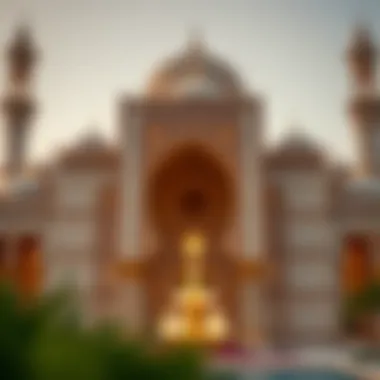Understanding Ramadan 2024 Timetable in the UAE


Intro
Ramadan is not just a month of fasting; it's a vital part of the Islamic faith, rich in cultural and social dimensions. The month impacts various walks of life, including family dynamics, community gatherings, and even economic activities. In 2024, this period takes on special significance in the United Arab Emirates, a melting pot of traditions that harmonizes both local and expatriate customs. As we delve into the Ramadan timetable for 2024, this article aims to provide you with a thorough overview of the essential dates, common practices, and the ramifications on both daily living and the broader market context in the UAE.
The expectations during Ramadan are high, as are the opportunities for personal reflection and community engagement. In recent years, the way Ramadan is observed has evolved, influenced by changing societal norms and technological advancements.
This article will guide readers through the intricacies of the Ramadan timetable, helping them prepare effectively, whether for personal observances or professional engagements. From the start and end of fasting to the significance of prayer and charity, gaining a better understanding of these elements is essential.
Additionally, for investors and professionals, understanding the impact of Ramadan on the real estate and business landscape is crucial. The article will touch on market trends and opportunities that arise during this sacred month, allowing readers to capitalize on investment prospects.
Join us as we navigate through the key themes of Ramadan 2024 in the UAE, offering insights that blend cultural reverence with practical implications.
Prelims to Ramadan
Among the various traditions and practices that hold significance in the Islamic calendar, Ramadan stands out as a time of reflection, community, and spirituality. This article aims to illuminate the foundations of Ramadan, specifically tailored for those looking to navigate through its complexities in 2024 within the UAE. By understanding the essence of Ramadan, readers can appreciate not only its religious connotations but also its manifold impacts on both individual lives and the broader economic landscape.
Definition of Ramadan
Ramadan, the ninth month of the Islamic lunar calendar, is recognized globally as a holy period for Muslims. The month is marked by fasting from dawn until sunset, where believers abstain from food, drink, and other physical needs during daylight hours. This practice serves as a form of self-discipline and reflection. Fasting goes beyond just refraining from eating; it encompasses the purification of the soul and a commitment to spiritual awakening.
The beginning of Ramadan is determined by the sighting of the crescent moon, which can slightly vary each year, resulting in its dates shifting by roughly eleven days annually. In 2024, the observances will initiate in the evening, depending on the lunar sighting, with millions joining in communal prayers, known as Tarawih, to deepen their connection to faith.
Significance in Islam
The significance of Ramadan transcends simple dietary restrictions; it holds a profound place in the hearts of Muslims worldwide. This month is not merely about refraining from sustenance, but rather cultivating a heightened sense of spirituality. It is widely believed that during Ramadan, the Quran was revealed to the Prophet Muhammad, marking it as a time of deep reflection on religious teachings.
"Fasting is not just abstaining from food, but also from follies and disputes."
– Unknown
This period encourages self-restraint, empathy towards the less fortunate, and fosters a strong community spirit. Charitable giving, or Zakat, tends to increase during this month as people feel a stronger pull toward supporting those in need.
Furthermore, Ramadan serves as a critical reminder of socio-economic disparities, prompting many to reach out to those less fortunate, a key tenet of Islamic faith. The month aims not only to build personal piety but also strengthens communal ties, making it a multifaceted occasion filled with revered traditions and essential teachings.
Ramadan Dates
Understanding the dates of Ramadan in 2024 is paramount for those involved or connected with Islamic traditions in the UAE. The specific dates can dictate plans, schedules, and even community interactions. For Muslims, knowing when Ramadan begins and ends impacts not just religious observance, but also daily life, including work, school, and social activities. Moreover, for investors and business professionals, understanding this timetable can influence strategies and operations in the local market. Everyone from families planning Iftar gatherings to businesses adjusting advertising strategies will find the information vital to navigating this significant month.
Starting Date
In 2024, Ramadan is anticipated to start on the evening of Sunday, March 10, although the exact date may vary depending on the sighting of the crescent moon. This variability is deeply embedded in Islamic tradition, as communities often come together in anticipation, looking to the sky to confirm the beginning of this holy period. For many, the start of Ramadan is much more than just a date; it marks the beginning of a month dedicated to spiritual reflection, increased devotion, and communal prayers.
As the first day of fasting approaches, many families prepare by purchasing supplies for both Iftar and Suhoor. Iftar, the meal breaking the fast, traditionally features dates and water, often followed by larger meals enjoyed with family members. Such preparations underscore the social fabric of Ramadan; it’s a time when people reunite, share food, and uphold traditions. This starting date is not only a simple mark on the calendar but a signal for spiritual and communal activity to elevate and deepen faith.
Ending Date
The anticipated end of Ramadan in 2024 will likely be on the evening of Tuesday, April 9, leading to the celebration of Eid al-Fitr the following day. Eid signifies the breaking of the fast and is celebrated with communal prayers, festive meals, and gift-giving. Just like the starting date, the ending date requires an awareness of lunar observations, meaning the community remains engaged right up to the final moments of Ramadan.
The conclusion of this month holds deep importance, as it provides a time for reflection on the month just passed and a hope for continued growth. For those who fast, Eid is a moment of joy to be shared with family and friends and also a period to engage in acts of charity. Such practices are not simply cultural; they are an extension of the spiritual journey that Ramadan facilitates.
The significance of these dates stretches into various aspects of life, guiding people’s routines and even influencing business practices. By understanding the timings associated with Ramadan, individuals and enterprises can ensure respectful engagement with the community and maximize the potential for positive interactions during this spiritual season.


Daily Timetable during Ramadan
The daily timetable during Ramadan is pivotal for both worship and routine. Understanding this timetable is crucial as it not only delineates the framework for fasting but also scaffolds the spiritual and communal practices that develop during this month. Each day is marked by specific timings that govern fasting and prayer, ensuring that individuals can align their physical and spiritual commitments. There’s a lot more than just time; it’s a roadmap to engage deeply in the experience of Ramadan.
Fasting Schedule
Fasting during Ramadan begins at dawn and concludes at sunset. The pre-dawn meal, known as Suhoor, must be consumed prior to Fajr, the first of the daily prayers. Typically, the fast starts anywhere between 4:30 AM and 5:30 AM, depending on the geographical location and the time of year. Breaking fast at sunset, which is called Iftar, occurs just after Maghrib, when the sun dips below the horizon. Noting the local times is essential because they can vary slightly from one place to another within the UAE.
It's important to plan meals accordingly, as a good Suhoor can sustain you through the day.
Prayer Times
Prayer times are a significant component during Ramadan, with five prayers being performed throughout the day. Here’s how they are generally positioned within the daily timetable:
- Fajr (pre-dawn)
- Dhuhr (midday)
- Asr (afternoon)
- Maghrib (sunset)
- Isha (night)
During Ramadan, the Taraweeh prayers are held after the Isha prayer, which offers an additional spiritual avenue to engage with the Quran through extended readings. Adjustments in schedules for these prayers should be factored in, as many mosques extend their hours, and new prayer gatherings may form across communities.
Iftar Traditions
Iftar is not merely a meal; it’s a communal gathering that brings family and friends together. Traditionally, Muslims break their fast with dates and water, following the practice of the Prophet Muhammad. After that, a spread of dishes typical of Emirati cuisine, like harees, ma’amoul, and shorbat come into play.
The act of sharing Iftar meals is a celebrated tradition that underscores the values of community and hospitality within Emirati culture. Many hotels and restaurants in the UAE take part, providing lavish buffets and special offers to accommodate those breaking their fast.
Suhoor Practices
Suhoor is equally as important as Iftar, providing energy and hydration for the day ahead. It’s often recommended to consume slow-digesting foods like oats and whole grains, along with ample water, to stave off dehydration and fatigue. The timing is crucial; Suhoor should conclude a few minutes before Fajr prayer.
Families often make it a point to gather for Suhoor, promoting a sense of unity and spiritual reflection. This meal is sometimes paired with dua (supplication) as an expression of faith and intention for the day.
In summary, the daily timetable in Ramadan offers a structure that enhances ways to observe fasting, prayer, and cultural practices. Recognizing the importance of the timing and practices associated with each segment of the day helps in fostering a holistic spiritual environment.
Engaging in these experiences requires readiness, mindfulness, and an emphasis on community values, which collectively fortify the ethos of Ramadan.
Cultural Practices During Ramadan
Cultural practices during Ramadan draw a vibrant tapestry of community engagement, tradition, and shared values. This is not merely a month of fasting, but a time when social fabric strengthens and time-honored customs come alive in the UAE. The cultural significance of Ramadan manifests through community gatherings and charitable acts, enriching the lives of both givers and recipients alike.
Community Gatherings
During Ramadan, community gatherings play a pivotal role. Neighborhoods come alive, with people flocking to local mosques and community halls, bringing with them a sense of togetherness. Iftar meals, the evening meal that breaks the fast, often turn into communal feasts. Families invite neighbors, friends, and even strangers to join in, fostering connections that run deeper than just a shared meal.
The spirit of hospitality is palpable. Streets bustle with pop-up iftar tents, where food is often served for free to anyone. This practice not only satiates hunger but also reinforces bonds within the community.
"Sharing food during Ramadan is not just about satisfying the appetite; it is about communion and cultural expression."
Such gatherings are more than just meals; they symbolize unity in diversity. In the UAE, where a mix of cultures coexist, you might find iftar menus that reflect various culinary traditions—ranging from Emirati dishes to foods from Southeast Asia, South Asia, and even Western cuisines.
Charitable Acts
The practice of giving during Ramadan also holds great importance. This month is characterized by heightened acts of charity, termed Zakat and Sadaqah. Zakat is a mandated form of almsgiving, while Sadaqah is voluntary charity. This emphasis on charitable acts signifies not only an obligation but a profound opportunity to help those in need.


Charitable organizations in the UAE ramp up activities during this month, organizing food drives, donating meals, and ensuring that the underprivileged have access to nutritious iftar. Many organizations provide iftar packs filled with dates, water, and traditional dishes to those who cannot afford them. Individuals, too, often set aside a portion of their earnings or time to contribute to these causes.
Additionally, the emphasis on community service is evident through diverse initiatives—such as educational programs for children and support for families struggling with basic needs. This flow of generosity highlighted during Ramadan strengthens societal ties and fosters empathy and understanding.
In essence, the cultural practices observed during Ramadan not only enhance individual spirituality, but they also weave a rich, interconnected community tapestry that showcases the best of humanity.
Impact on Daily Life
During Ramadan, the rhythm of daily life shifts perceptibly in the UAE, affecting everything from work patterns to educational structures. The observance of fasting isn't merely about abstaining from food and drink; it interweaves with social, spiritual, and economic dimensions of life. Understanding these changes is crucial for both residents and those conducting business in the region.
Work Hour Adjustments
The work culture in the UAE experiences significant adjustments during Ramadan, which is crucial for ensuring productivity while respecting the fasting observance. Companies often reduce their working hours, allowing employees to maintain energy levels despite fasting. Typically, the official working hours can range from six to seven hours per day, starting later to accommodate early morning meals before dawn.
Many businesses adopt flexible schedules to ensure that employees can leave in time for prayer or iftar, the meal that breaks the fast. This flexibility can lead to variations in meeting times, creating a need for professionals to strategize effectively. Companies also might implement strategies to keep morale high during this demanding period. Some employers introduce team Iftar gatherings, catching a bit of community spirit while enjoying a shared meal. This can enhance camaraderie and productivity when work hours resume after the holy month.
- Benefits of Adjusting Work Hours
- Supports the wellbeing of employees by accommodating their fasting schedule
- Enhances productivity by aligning work expectations with the altered daily routine
- Fosters a sense of community and understanding among colleagues
School Schedules
Adjustments in school schedules are also common during Ramadan, which can significantly impact families with school-age children. Schools often modify the start and end times of daily classes, allowing students to balance their educational commitments with the fasting routine. Generally, schools may reduce their hours as well, with lessons starting later than usual. Many institutions prioritize activities that maintain engagement without draining energy levels, focusing more on interactive and less strenuous lessons.
Parents, too, play a vital role in preparing children for these adjustments. They may choose to serve suhoor meals that are hearty and energizing, ensuring that their children are well-fueled for both fasting and learning. Educational institutions often organize special events, such as charity drives or cultural talks, to honor the spirit of Ramadan, imparting values of empathy and generosity.
Business Considerations
The business landscape during Ramadan in the UAE undergoes significant transformations. Understanding these shifts is crucial for stakeholders in various sectors, including retail, hospitality, and real estate. This part will dive into how Ramadan influences consumer behavior and the real estate market, providing insights essential for investors, homeowners, and professionals alike.
Changes in Consumer Behavior
As the holy month of Ramadan approaches, consumer behavior morphs considerably. In the UAE, fasting shifts schedules, leading to altered shopping habits that businesses should be keen to address.
Key aspects include:
- Increased Spending: During Ramadan, many individuals tend to spend more on food, clothing, and gifts. Retailers should prepare for higher demand, particularly in categories like food and consumer electronics, which are popular for gifting.
- Night Shopping: With many people remaining active at night post-iftar, shopping hours typically extend. Stores often open later, accommodating consumers who rush to break their fast and then shop, allowing businesses to capitalize on evening traffic.
- E-commerce Growth: The digital space sees a surge as well. Online platforms like Noon and Amazon experience heightened activity, making it essential for local businesses to strengthen their online presence. Leveraging digital marketing during this period can drive sales upwards.
"Ramadan is more than just about fasting. It's a unique opportunity for businesses to connect with the community, offering products and services tailored to this special month."
- Brand Loyalty: Consumers often prefer brands that respect and observe Ramadan traditions, leading to potential brand loyalty shifts. Companies should reflect cultural sensitivity in their marketing strategies and product offerings.
Understanding these consumer trends leads to strategic planning, which can maximize profits and enhance customer satisfaction during this sacred month.
Real Estate Market Trends
The real estate sector also experiences significant dynamics during Ramadan. Potential buyers and renters often have different priorities when it comes to property decisions during this time.
Important elements to consider are:
- Leasing Patterns: Many people prefer to secure new homes before Ramadan begins, aiming to settle in before the holy month. Real estate agents and property managers should anticipate this surge in demand, particularly in family-friendly neighborhoods.
- Investment Opportunities: For those looking at investment properties, Ramadan can often present unique buying and selling opportunities. Property values in popular areas can experience seasonal fluctuations, making it a good time for seasoned investors to assess market conditions.
- Focus on Community: Properties near mosques or with community-focused amenities tend to attract more interest. Buyers often look for a sense of community during Ramadan, influencing their real estate decisions. Hence, showcasing how a property fosters strong community ties can enhance its appeal.
- Seasonal Adjustments: Some property managers might adjust rental agreements or offer incentives during Ramadan to attract tenants. Flexibility in leasing terms can be valuable in ensuring high occupancy rates.


For more in-depth information about consumer behaviors during Ramadan, visit Wikipedia.
Real estate trends during this month can also be insightful, so refer to resources like Britannica for further understanding.
Local Observance Variations
Ramadan is not merely a month of fasting; it's a vibrant tapestry woven with diverse cultural threads, particularly within the United Arab Emirates. Understanding local observance variations is crucial for both residents and visitors as it reveals the rich layers of tradition, practice, and community spirit that define this holy month. The UAE is home to a melting pot of cultures, and this diversity is vividly reflected in how Ramadan is experienced.
Diversity within the UAE
The UAE comprises seven emirates, each with its own unique cultural identity and traditions related to Ramadan. Take Dubai, for instance; it is a bustling metropolis where modernity meets tradition. The way Dubaians observe Ramadan can be a blend of traditional practices and contemporary celebrations. Iftar is often spent in lavish restaurants, many of which roll out special menus to cater to the tastes of diverse nationalities. On the other hand, in Sharjah, you might find families gathering at home for breaking the fast, valuing intimate domestic settings over lavish dining.
Similarly, Abu Dhabi embraces its own flavor of Ramadan observances. Many people partake in community Iftars organized by the government, fostering a spirit of unity and camaraderie among residents. Al Ain, with its more traditional approach, puts emphasis on cultural heritage, where you can find local markets bustling with activity and community engagement during the evenings.
These variances reflect the adaptability and respect for tradition across the UAE, showcasing how Ramadan is not a one-size-fits-all affair. It's about balance—between maintaining cultural roots and accommodating the influx of diverse influences from expatriates who call the UAE home.
Comparison with Other Countries
When comparing Ramadan practices in the UAE with those in other countries, one can see contrasting approaches that influence how the month is commemorated. For example, in Saudi Arabia, the observance is deeply rooted in Islamic customs, with public life significantly slowed down during the fasting hours. Society often embodies a more religious atmosphere, filled with Qur’anic recitations and communal prayers.
In contrast, countries like Indonesia and Malaysia celebrate with vibrant community events, street markets, and special fairs that bring together various cultures, not unlike the UAE, yet distinctly flavored by local traditions. The rhythm of Ramadan in these countries is often more about festivity, highlighting communal aspects through a series of events.
"Ramadan transcends mere fasting; it's a deeply woven societal fabric that transforms lives and communities, showing immense variation globally."
While the core tenets of fasting and prayer are universally respected, how these principles manifest varies widely. This richness is what makes studying the local observance variations so essential, as it emphasizes the importance of regional nuances and cultural significance.
Health Considerations
Understanding health considerations during Ramadan is critical for anyone who observes fasting. The month brings unique challenges in terms of hydration and nutrition, both of which significantly influence overall well-being. Particularly in the UAE, where the climate can be quite harsh, being mindful of health can make for a more pleasant and spiritually fulfilling experience.
Fasting and Hydration
Fasting from dawn until sunset can pose certain challenges, especially concerning hydration. The long hours without water can lead to dehydration if not addressed appropriately. It's not just about stopping food intake; it’s about managing fluid levels as well.
- Importance of Hydration: Dehydration can impact energy levels, concentration, and physical performance. Given the sweltering temperatures typical in the UAE during Ramadan, maintaining adequate hydration becomes even more crucial. Observers should aim to drink plenty of fluids between iftar and suhoor to replenish what’s lost during the day.
- Hydration Tips: When breaking the fast, it’s advisable to sip water slowly rather than gulp it down. This helps your body absorb it better. Including hydrating foods, like cucumbers or watermelons, can also be beneficial.
"In the desert, water is life. During Ramadan, it’s how you shape yours."
Nutritional Advice
Nutrition plays a pivotal role in reenergizing the body after a day of fasting. Providing your body with the right nutrients ensures that you can carry out daily tasks comfortably while also fulfilling spiritual duties.
- Balanced Meals: It’s vital to consume a balanced iftar and suhoor. Include proteins, carbohydrates, and healthy fats. Foods like lentils, chicken, and nuts can offer sustained energy.
- Avoiding Sugary or Fried Foods: It might be tempting to indulge in sweets and fried foods post-fast, but these can lead to fluctuating sugar levels and energy crashes. Moderation is key.
- Eating Frequency: Try to consume at least two smaller meals between iftar and suhoor instead of one large meal. This can help with digestion and maintaining energy levels throughout the day.
End
As we draw to a close on our exploration of the Ramadan timetable in 2024 for the UAE, it's worth reflecting on the significance of this month, not just as a period of fasting but as a time imbued with profound cultural and spiritual meaning. Ramadan is much more than abstaining from food during daylight hours; it's a cornerstone of Islamic tradition, fostering community, personal growth, and charitable acts.
Reflection on Ramadan's Importance
In understanding the overall narrative of Ramadan, it's imperative to emphasize the role it plays in connecting individuals with their faith and community. Here are some considerations:
- Spiritual Renewal: Ramadan Acts as a time for introspection and rejuvenation of one's faith. Muslims around the globe use this period to cultivate a deeper connection with Allah through prayers and Quranic recitations. This spiritual focus helps to reinforce the core tenets of Islam and often results in a renewed sense of purpose and commitment among participants.
- Cultural Solidarity: The communal aspects of Ramadan are equally significant. Families and friends gather to break their fasts, share thoughts, and strengthen relationships. In the UAE, this bond is amplified as diverse nationalities partake in Iftar, offering a rich tapestry of cultural exchange that contributes to the unity of the nation.
- Charitable Actions: Charity (or Zakat) is a vital component of Ramadan, where giving to those in need takes center stage. The practices of donating time, food, or money assist the less fortunate and embody the themes of empathy and solidarity that characterize this holy month.
- Business Impact: For professionals, understanding Ramadan's significance is crucial in adapting business practices. Marked changes in consumer behavior during this month need consideration for optimal service delivery. Businesses often adjust operating hours, introduce special promotions, and cater to the unique demands of their clientele.
- Health Consciousness: Last but not least, there's a notable emphasis on health during Ramadan. Many individuals reassess their dietary habits, focusing on nutrition during suhoor and iftar. This awareness speaks to a broader trend of health consciousness that is becoming increasingly important in today’s society.
"Ramadan serves multiple purposes - a month of reflection, a surge of giving, and a time for shared experiences. Its significance resonates far and wide."
Ultimately, the Ramadan timetable is a structure that supports not only adherence to religious practice but also embodies elements that benefit both individuals and the community at large. As professionals, understanding these dimensions enables better engagement with the community and opens avenues for meaningful interactions that extend beyond the holy month itself. The reflections and experiences gathered from Ramadan can positively impact personal lives and careers long after the month concludes.







